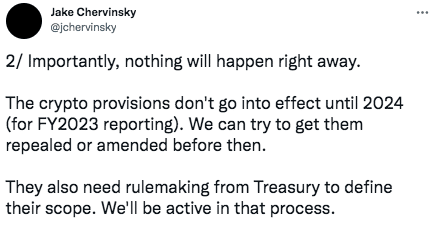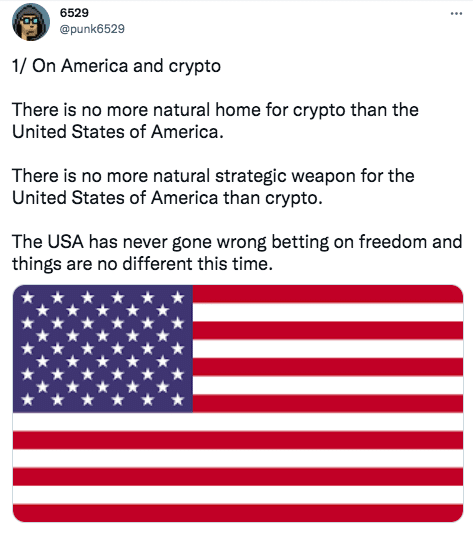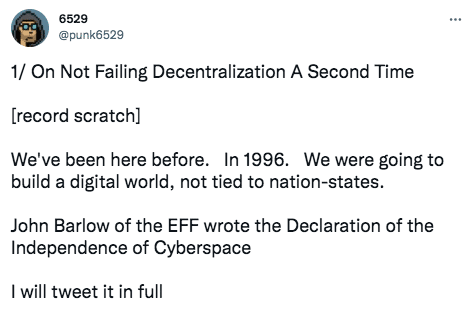November 8, 2021 / Unchained Daily / Laura Shin
Daily Bits ✍️✍️✍️
-
Paradigm co-founder Matt Huang is now on the board of directors at Stripe,
-
Solana crossed $260 the first time, marking a new all-time high.
-
NFT.NYC was like “Woodstock” (New York Times).
-
The FBI warns that hackers are using ATMs and QR codesto run scams.
-
Addresses may begin claiming ENS tokens today.
-
Kadena, a JP Morgan cryptocurrency spinoff, reached anall-time high Sunday morning (UTC).
-
Jack in the Box is suing FTX over FTX’s mascot.
-
Chinese police seized $62 million in crypto from an alleged Filecoin mining scheme.
- The value locked into smart contracts depending on Chainlink data oracles grew ten times over the last year.
What Do You Meme?
What’s Poppin’?
Late Friday night, the US House of Representatives passed an infrastructure bill containing two provisions that could significantly affect the cryptocurrency industry. The House voted in favor 228-206 and will most likely be signed promptly by President Joe Biden.
Proponents of crypto were worried about the language regarding crypto brokers. Under the current language found within the infrastructure bill, crypto “brokers” must report customer gains via a 1099 and any transactions over $10,000 to the Internal Revenue Service. Kristin Smith, executive director of the Blockchain Association, told CoinDesk back in August, “We interpret this to mean software wallet developers, hardware wallet manufacturers, multisig service providers, liquidity providers, DAO token holders and potentially even miners,” would be considered a “broker” under the original language of the bill. (Kristin also appeared on Unchained in August, which you can watch here.)
In addition, along with the problematic expansion of the term “broker,” the infrastructure bill includes an amendment to Tax code section 6050I. The law was initially written to require parties to report Social Security numbers on trading partners for cash transactions over $10,000 within 15 days. The infrastructure bill language would require the same reporting for digital asset transactions.
The provision, which Coin Center describes as “unworkable” and “unconstitutional,” would make not reporting on such an event a criminal felony, according to Abe Sutherland in his appearance on Unchained in October.
Jake Chervinksy, a lawyer and strategic advisor at Variant Fund, said, “it’s out of our hands now” regarding actions to stop the bill from passing. He added, “Importantly, nothing will happen right away. The crypto provisions don’t go into effect until 2024 (for FY2023 reporting). We can try to get them repealed or amended before then.”
Recommended Reads
- @punk6529 on why the US could be the natural home of crypto:
- @punk6529 on why the EU could be the natural home of crypto:
- @punk6529 on not failing to decentralize:
On The Pod…
Legal Issues With NFTs: Would a Fractionalized Mona Lisa Be a Security?
At Non-Fungible Castle 2021, an NFT exhibition in Prague, four NFT experts discuss the legal implications of NFTs. Guests include Jonathan Victor, product/business development at Protocol Labs; Louis Baudoin, advisor at Monax; Diana Stern, product counsel at Stripe; and Shant Marootian COO at Fractional.art. Show highlights:
-
what users are receiving with the purchase of an NFT
-
how the terms of service for different NFT marketplaces change NFT rights
-
how on-chain storage and off-chain storage affects NFT ownership
-
what rights do creators need to mint an NFT
-
what recourse creators have if someone mints their art as an NFT and profits from it
-
whether NFT marketplaces should respect NFT royalty standards on resales
-
how NFT marketplaces could make it easier for creators to clarify licensing and royalty standards
-
whether NFTs should be regulated under existing laws and what gaps in regulation need to be filled
-
when an NFT should be considered a security
-
how different jurisdictions may work together to regulate NFTs
-
why money laundering is a problem for NFTs
-
how a DAO could go about owning an NFT or IP
-
what would happen to NFTs and DAOs if Ethereum were to suffer a hard fork again
-
why DAOs should stay compliant with traditional regulations
-
how to improve licensing and industry standards for NFTs
-
whether NFTs should be considered as financial objects
-
what would happen if a museum fractionalized the Mona Lisa
Book Update
My book, The Cryptopians: Idealism, Greed, Lies, and the Making of the First Big Cryptocurrency Craze, is now available for pre-order now.
The book, which is all about Ethereum and the 2017 ICO mania, comes out Feb. 22. Pre-order it today!
You can purchase it here: http://bit.ly/cryptopians







